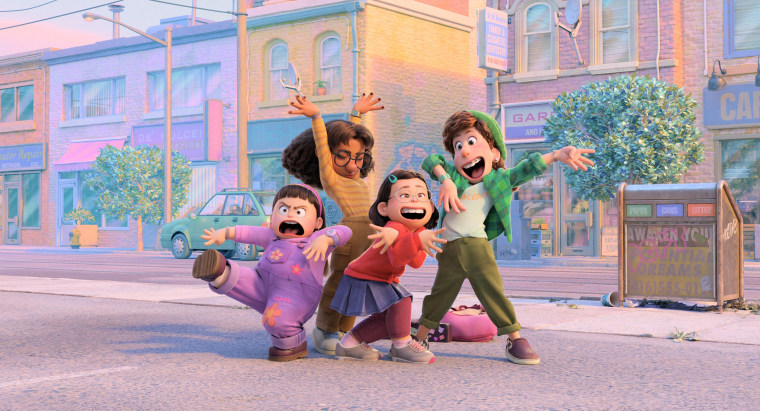“Turning Red,” Pixar’s first feature-length film directed by an Asian woman, received strongly favorable reviews overall by film critics and audience members — but not without some criticizing it as too “alienating” and “narrow.”
The coming-of-age story follows a 13-year-old Chinese Canadian, Meilin, who must learn how to navigate puberty and be a dutiful daughter. She has an ancestral connection to red pandas and is imbued with the ability to turn into the animal when she feels intense emotions.
The film, directed by Academy Award winner Domee Shi and starring Sandra Oh (as Meilin's mother), was rated 95 percent certified fresh on Rotten Tomatoes and was ranked 12 out of 26 on Rotten Tomatoes’ list of Pixar films. The overall critics' consensus on the website was positive and read: “Heartwarming, humorous, beautifully animated, and culturally expansive, Turning Red extends Pixar’s long list of family-friendly triumphs."
But a Twitter user pointed out the discrepancy between critics and the public, with some viewers saying it’s “targeted to a specific audience” and “wildly inappropriate."
One viewer on Rotten Tomatoes said the film was “totally unrelatable to the general population,” while another said it was “crude” to talk about puberty; both gave the film one star.
Some of the criticism surrounds the idea of encouraging teenage rebellion, but a number of viewers and critics are pointing out some of the double standards in the criticism and how race and gender might play into the idea of not being relatable.
Last week, CinemaBlend managing editor Sean O’Connell faced backlash after publishing his now-deleted review, which many users called “sexist” and “racist.”
“I recognized the humor in the film, but connected with none of it. By rooting ‘Turning Red’ very specifically in the Asian community of Toronto, the film legitimately feels like it was made for Domee Shi’s friends and immediate family members,” O’Connell wrote. “Which is fine — but also, a tad limiting in its scope.”
CinemaBlend later apologized for publishing the review. Editor-in-chief Mack Rawden said in a statement: “We failed to properly edit this review, and it never should have gone up. We have unpublished it and assigned to someone else. We have also added new levels of editorial oversight. Thank you to everyone who spoke up.”
Other users were quick to disagree with the negative reviews and praised “Turning Red” for its depiction of puberty and the shared experience teenage girls go through.
Disney and Pixar did not respond to NBC Asian America’s request for comment.
“Turning Red is quirky, and surreal, but at its core, it is a mother and daughter finally embracing change in all of its messy, and furry forms, even if it means saying goodbye to the relationship you once had,” Shi, who an Oscar in 2019 for best animated short film, "Bao," previously told NBC Asian America.
